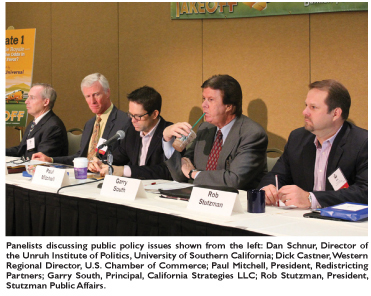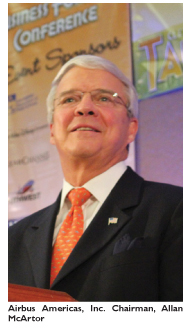|
 Airbus Americas, Inc. Chairman, Allan McArtor declared that Southern California is ripe and ready for a resurgence in the aerospace industry. During the luncheon portion of the Valley Industry and Commerce Association’s (VICA) 24th Annual Business Forecast Conference, sponsored by Wells Fargo and Woodbury University, Airbus Americas, Inc. Chairman, Allan McArtor declared that Southern California is ripe and ready for a resurgence in the aerospace industry. During the luncheon portion of the Valley Industry and Commerce Association’s (VICA) 24th Annual Business Forecast Conference, sponsored by Wells Fargo and Woodbury University,
Staying with the theme of the afternoon’s event, Cleared for Takeoff, McArtor touched on Airbus’s growth and accomplishments, as well as the expansion of Los Angeles international airport. “Southern California is an attractive region for manufacturing due to the skills, dependability and schools,” he said, explaining Airbus’s investment in the area.
McArtor also commended VICA for its strong advocacy efforts. “VICA is one of the most powerful business organizations in the country,” he said as he started his luncheon address.
“McArtor reminded us of California’s former glory as a manufacturing hub,” said VICA President Stuart Waldman. “It was good to hear that companies are, once again, investing in moving the state forward.”

William Roberts (San Fernando Valley Economic Research Center at CSU, Northridge) closed the discussion with notes on the local economy. Though relatively pessimistic about issues surrounding the state budget and government impact on business, he did offer optimistic reports on the housing and construction industries making a slow recovery. Gary Schlossberg (Wells Capital Management) offered a modest view of the economy, though tried to remain optimistic in the process.
Demosthenes Vardiabasis (Pepperdine University) spoke on the importance of innovation, entertainment and tourism to the California economy. He offered interesting views on the European economic crisis and the impact of debt, particularly Chinese debt, on the American economy. Don St. Clair of Woodbury University served as the panel moderator.
“It is clear that after years of our economy struggling, California is ready to make a turn around,” said VICA Chair David Adelman. “The news of recovery in certain sectors will translate to growth throughout the state.”
The conference featured eight breakout panels focusing on public policy issues that have had a profound impact on the business community.
Panel summaries
Battle Royale—Are the Odds in their Favor?
The political experts discussed everything from legislative races to their predictions for the Presidential election. Redistricting was a hot topic as the panelists discussed the possible negative consequences associated with changing constituent bases. Hopefully, they declared, the new structure will make elections in California more meaningful. The panelists also discussed the demographics of voters in the new districts according to 2010 census data. Panelist Rob Stutzman stated that the current  demographics of the state are a problem for California Republicans. demographics of the state are a problem for California Republicans.
Death and Taxes—2012 Ballot Initiatives
Panelists focused on the skepticism of voters and their general distrust and resentment towards Sacramento. With competing tax measures on the ballot and public perception of the state’s use of funding reaching all-time negativity, the experts predicted that most of the initiatives will fail in November.
Running on Empty
Agreeing on the need for California to seek out cleaner, renewable alternative fuels for the state, panelists discussed the implementation of AB 32 and other climate change regulations. All of the panelists agreed that the implementation schedule of AB 32 regulations is resulting in significant negative economic consequences. Panelists also concurred that the state needs to pursue a menu of cleaner options. Panelists stressed that, without mass implementation of these alternative fuels, California will not be able to meet the environmental goals that have been set.
Sinking in Quicksand
California is well known for being unfriendly towards the business community. In this panel, experts spoke on the over-regulation and the difficulties of doing business in the state. They stressed that the state’s leadership does not believe that California has a “regulation problem” or a bad business climate. As a testament to the poor climate, most businesses that are looking to relocate are not considering California, due to the tax system, over-regulation, lack of incentives and high labor costs. Panelists also covered the number of jobs that have been lost due to outsourcing and companies moving overseas, especially to China.
The Right Prescription?
While the new healthcare law can be debated at length, all of the panelists agreed on one thing: there needs to be more focus on wellness and lifestyle issues. The biggest healthcare issue facing the United States is lifestyle related illnesses such as obesity, diabetes and other chronic diseases.

Back to Black: The Need for Pension Reform
Following the passage of the recent pension reform bill, AB 340, this panel discussed the need for state leaders to continue moving forward in changes to the California Public Employees Retirement System (CalPERS) and California State Teachers Retirement System (CalSTRS). Panelists floated the idea of requiring voter approval on pension increases and moving the state toward a defined contribution system rather than a defined benefit system. These experts also spoke about what they believed it would take for the state to maintain the funding needed for the current system—such as selling off a number of public assets.
Casting Your Mobile Net
Mobile experts spoke to attendees about building a company brand and using that brand across all media platforms. Panelists also discussed the need for mobile strategy and mobile websites. One problem panelists noted was that many companies do not use mobile websites and their current websites are unusable on mobile devices.
Move It, Move It!
With Southern California being the second biggest retail market in the country, panelists stressed that the region is one of the best places for importing goods. Panelists also discussed the minimal impact that the expansion of the Panama Canal is expected to have on Southern California and our ports, and the expectation that the railroads will continue to grow throughout the region.

|